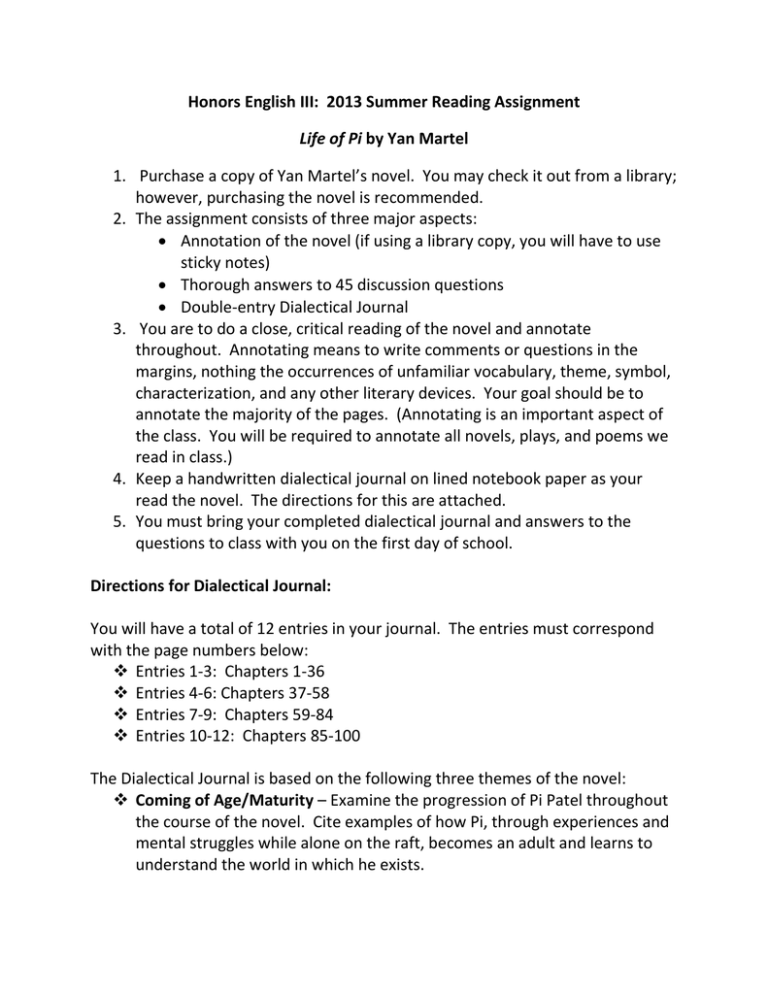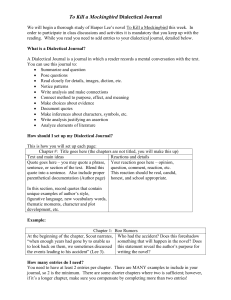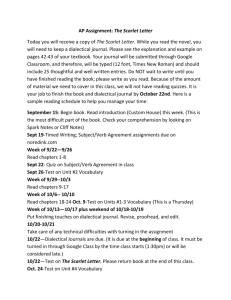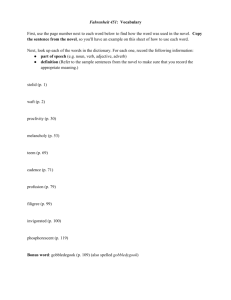word document
advertisement

Honors English III: 2013 Summer Reading Assignment Life of Pi by Yan Martel 1. Purchase a copy of Yan Martel’s novel. You may check it out from a library; however, purchasing the novel is recommended. 2. The assignment consists of three major aspects: Annotation of the novel (if using a library copy, you will have to use sticky notes) Thorough answers to 45 discussion questions Double-entry Dialectical Journal 3. You are to do a close, critical reading of the novel and annotate throughout. Annotating means to write comments or questions in the margins, nothing the occurrences of unfamiliar vocabulary, theme, symbol, characterization, and any other literary devices. Your goal should be to annotate the majority of the pages. (Annotating is an important aspect of the class. You will be required to annotate all novels, plays, and poems we read in class.) 4. Keep a handwritten dialectical journal on lined notebook paper as your read the novel. The directions for this are attached. 5. You must bring your completed dialectical journal and answers to the questions to class with you on the first day of school. Directions for Dialectical Journal: You will have a total of 12 entries in your journal. The entries must correspond with the page numbers below: Entries 1-3: Chapters 1-36 Entries 4-6: Chapters 37-58 Entries 7-9: Chapters 59-84 Entries 10-12: Chapters 85-100 The Dialectical Journal is based on the following three themes of the novel: Coming of Age/Maturity – Examine the progression of Pi Patel throughout the course of the novel. Cite examples of how Pi, through experiences and mental struggles while alone on the raft, becomes an adult and learns to understand the world in which he exists. Faith and Religion – Pi Patel, while struggling for survival in the middle of the Pacific Ocean, faces both physical and mental hardships. How does religion and/or faith factor in his experience of survival and ability to overcome these hardships? What conclusions does Pi draw regarding different world religions and his own personal faith? Fear – An overwhelming issue facing Pi as he confronts a 450 pound tiger in a small raft with no help in sight is the ability to control his fear and mentally face a troubling situation. In what ways does pi learn to cope with his fear? How does fear affect him both physically and mentally? How does the role of fear change from the beginning of the book to the end? **You will be assigned an in-class essay based on the Life of Pi during the third week of school. You will need to recall specific examples in the book to use as evidence in your essay. You will be allowed to use your dialectical journal when completing your essay. YOUR DIALECTICAL JOURNAL MUST BE HANDWRITTEN. TYPED JOURNALS WILL NOT BE ACCEPTED! Dialectical Journal Set-up: Citing page numbers, write significant excerpts from the text on this side of the page. The excerpts of text will add meaning for your understanding of the themes. Cite 12 entries total. The entries must appear in chronological order. Be sure to specify the theme discussed in your entry. You may do this by using C (Coming of Age), R (Religion), or F (Fear). Directly across from the excerpts, write your original ideas about the importance of the text. This analysis must be at least two or three complete sentences. Your analysis should include: Interpretation of how the quote illustrates the theme Explanation of how the quote fits in with the plot of the novel EXAMPLE: (Remember, you will do three per section.) 1. R – “Bapu Ghandi said, ‘All religions are true.’ I just want to love God”, I blurted out, and looked down, red in the face (45). 1. Pi is frustrated with his teachers and parents who insist that he choose one religion to follow. Instead, Pi seeks a simpler version of faith that does not include the controversies and arguments that adults squabble over. Pi has intense faith, but he is not necessarily religious. 2. F – “I looked Richard Parker dead in the eyes. Suddenly his brute strength meant only moral weakness. It was nothing compared to the strength of my mind.” 3. PI finally confronts the fear that has been mentally exhausting him throughout his excursion. He realizes he has nothing to fear since his mental strength far surpasses the tiger’s physical strength. Part II: Discussion Questions for Life of Pi 1. Do you agree with Pi’s contention that animals in a zoo are no worse off than animals in the wild? Why or why not? Explain your answer thoroughly. 2. What are the three religions that Pi considers himself to be a convert of? Do you think it is possible for Pi to practice all three convictions faithfully? 3. What reasons does Pi give for not choosing one faith? 4. What is Pi’s full name? Where did it come from? Explore and discuss the significance of Pi’s name to the novel. 5. Explain the story of how Richard Parker got his name. 6. What does Richard Parker symbolize? 7. Describe the floating islands. What are the inhabitants? Explain the significance of the islands. 8. What does Pi find inside the fruit of the tree on the island? 9. Who or what ends up on the lifeboat with Pi? What does each of them symbolize? 10. Is Life of Pi a tragedy, a romance, or a comedy? Explain. 11. What was the name of the ship Pi was on that sank? 12. Where was the ship taking Pi and his family? 13. What are the different settings of the novel? 14. Who is the protagonist? 15. Who is the antagonist? 16. What is the mood of the novel? 17. What point of view is the novel written in? 18. When does the climax occur? 19. Where is the author when he first hears about Pi? 20. Who is narrating the italicized chapters? 21. Why does Pi hesitate in killing the fly fish? 22. What does Pi wish he had besides salvation? 23. Why couldn’t Pi see the other castaway? 24. Where did Pi’s lifeboat come ashore? 25. Where did they end up finding Richard Parker? 26. What does the book say is the most dangerous animal to man? 27. What does the book say is the most dangerous animal to zoo animals? 28. Besides the loss of his family and possessions, what else did Pi lose when the ship sank? What did he gain? 29. How does Mr. Patel’s zoo helping ability compare to his parenting skills? 30. Discuss the scene in which Mr. Patel arranges for his children to watch a tiger devour a goat. 31. What is his purpose? Did this in any way help to prepare Pi for the most difficult journey of his life? 32. Part one of the book begins twenty years after Pi’s ordeal. What words does Part one end with? Do you agree? Why or why not? 33. Do you agree with the claim from the book that this is a story “that will make you believe in God”? Explain. 34. Which story do you believe: the one with or without the animals? Why? 35. In his introductory note Yann Martel says, “This book was born as I was hungry.” What does he mean in this statement? 36. Pondicherry, India is described as an anomaly; the former capital of what was once French India. In terms of storytelling, what makes this place an appropriate place for Pi to grow up. 37. How might the story have changed if the hyena, zebra, or the orangutan would have been the sole survivor with Pi? 38. Discuss some of Pi’s strategies for dealing with Richard Parker. What do some of these strategies teach you about dealing with fear in your own life? 39. Why did Pi try so hard to save Richard Parker at the beginning? 40. Compare and contrast the grown up version of Pi to the little boy version. 41. Chapters 21 and 22 are very short, yet the author says they are at the core of the novel. Explain this. 42. Was Pi a convincing storyteller? Why or why not? 43. Does knowing Pi survives affect your reading of his survival account? Why or why not? 44. Discuss some of Pi’s survival techniques. 45. How does Pi train Richard Parker?







